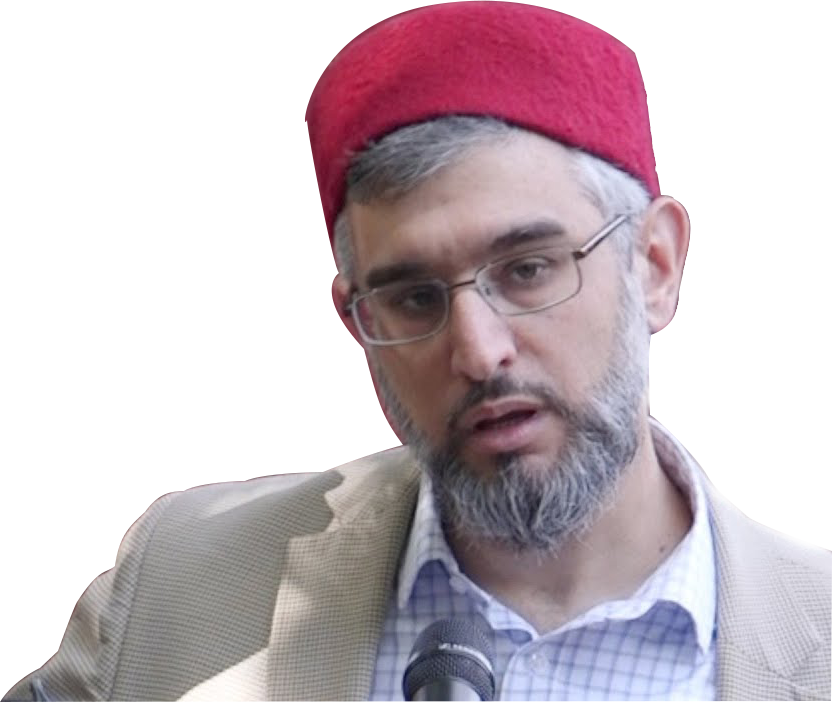Our Teachers
“The scholars are the inheritors of the prophets.” [Abu Dawud]

Ustadh Thaqib has travelled to numerous places over the last 10 years in pursuit of sacred knowledge. This began at several deen intensives with Shaykh Hamza Yusuf from whom the impetus to his seeking sacred knowledge belongs. After travelling to Morocco he went to Hadramawt to the village of Tarim where he sat at the feet of the spiritual Masters and jurists including Habib Umar bin Hafiz. He travelled to Damascus a number of times and studied under Shaykh Muhammad Darwish, Shaykh Abdul Wahaab Shaykh Muhammad al Yaqoubi, Shaykh Adnan al Majd, Shaykh Maree al Rashid and Shaykh Khalil al Sabbagh. His travels also led him to Mauritania to study with Murabit al Hajj, to Liverpool to study with Shaykh Siraj Ud-Din and to Istanbul at the feet of the gnostic and friend of Allah, Shaykh Mahmud Effendi; and studied with Shaykh Ehsaan Hojah and Shaykh Muhammed Ameen Siraj.”


Ustadh Noor graduated from Middlesex University with a joint BA Hons Degree in Accounting and Finance with Business Economics. He later completed a PGCE at Warwick University and taught for a number of years at Luton SFC whilst continuing his Islamic education on a part time basis.
In 2007 Noor-Udeen was blessed with the opportunity to travel abroad and study with some of the leading scholars of Syria, amongst them: Shaykh Samir Al-Nass, Shaykh Mazin Bakeer, Shaykh Rashad Shams and Shaykh Mojeer Al Khateeb. He followed a broad curriculum paying special attention to Fiqh (jurisprudence) and Seerah (prophetic biography).
Noor-Udeen has been involved in Dawa and teaching the Islamic sciences for over 10 years and is a founding member of the Shifa trust in Banbury.


Studied the disciplines of Islamic learning in Syria and Turkey, and is a university lecturer in Islamic history and theology. His works include Prayers of Occasions, a book describing different prayers to be performed throughout life.


Sohail Hanif has been studying the Islamic sciences since attending a summer intensive in 1996. After graduating in 2000 from Imperial College with a BEng in Information Systems Engineering, he travelled to Jordan where he spent an extended period of time studying the Islamic Sciences, privately with a number of teachers, and formally at the Anwar al-Ulama Institute. In this period he also worked as head of Arabic Sciences at Qasid Arabic Institute and taught Qur’anic exegesis and Hanafi law, amongst other subjects, for Qibla online. He is currently pursuing a PhD in Islamic Studies at Oxford University where his thesis focuses on Islamic legal theory.


Faiz Qureshy was born in Wembley, London. In 1998 he left the UK to study in Damascus, Syria, focusing on the Arabic language, Grammar, Morphology, Rhetoric, Tajwid and Hadith nomenclature. In 2001 he furthered his studies in Dar al-Mustafa, Hadramaut, Yemen. Whilst there he studied several disciplines including Jurisprudence, Arabic, Logic, Legal Theory, Hadith, Spirituality and Theology. His teachers include Shaykh Salim b. Ahmad al-Khatib, Habib Kazim al-Saqqaf, Habib Hashim b. Sahl, and Shaykh Muhammad Amin al-Chinquite and the noble Habib ‘Umar b. Hafiz. Since returning to the UK in 2006 he has taught for a number of educational initiatives across the UK alongside working as a project worker for almost three years with long-term sufferers of mental illnesses in inner London. He established the Ribat Institute in 2009 focusing on educational & community projects including forming a partnership with the Ihsan Foundation in Sierra Leone, West Africa. Since 2009 he has been the Imam to Broadmoor Hospital working with some of the most challenging incarcerated men in the UK.


Ustadh Tanweer studied the Islamic Sciences in Syria for 8 years with notable teachers such as:
Shaykh Dr. Samir al-Nass, Shaykh Abdul-Razzaq al-Halabi, Shaykh Adeeb Kallas, Shaykh Muhammad al-Yaqoubi, and Shaykh Anas al-Hibri. Ustadh Tanweer is a graduate of M’ahad al-Fath al-Islami.
He now resides in Oxfordshire, where he teaches at Shifa School, Shifa Evening School, and at the Sacred Study Programme. Ustadh Tanveer is an Executive Director of the Shifa Trust.


He was born in Damascus, Syria. He studied in the College of Medicine of the University of Damascus. He studied in the United States and became qualified in Medicine. He studied under some of the great ‘ulama of Sham and Saudi ‘Arabia. He has ijazah in the ten styles of recitation of the narration of Shatibiyyah and Durra from Sheikh Muhammad Sukr. He has ijazah in the ten styles of recitation of the narration of Tayyibah from Sheikh Ahmad Mustafa, who is a student of Sheikh Abd al-Aziz al-Zayyat of Egypt. He has ijazah in fiqh and ‘aqida from Sheikh Abu Yusr ibn ‘Abidin, Sheikh Lufti Fayumi, and Sheikh Adeeb al-kallas.
He has ijazah in hadith from Sheikh Yasin Fadani al-Makki, and Sheikh Dr. Nur ud-din Itar. He also has ijazah in hadith from al-Hafidh Sheikh Abd Allah Siraj ud-din. He has taught at various din-intensive courses in England and North America.
Sheikh Samir is presently a teacher in the the M’ahad al-Fath in Damascus, teaching Hanafi Fiqh in the Takhassus Shariah department and lecturing in
the Masters department.
Sheikh Samir teaches Tajwid on a daily basis in the blessed masjid of Sheikh Ibn ‘Arabi, a post given to him by his sheikh and father-in-law, Sheikh Muhammad al-Sukr.


